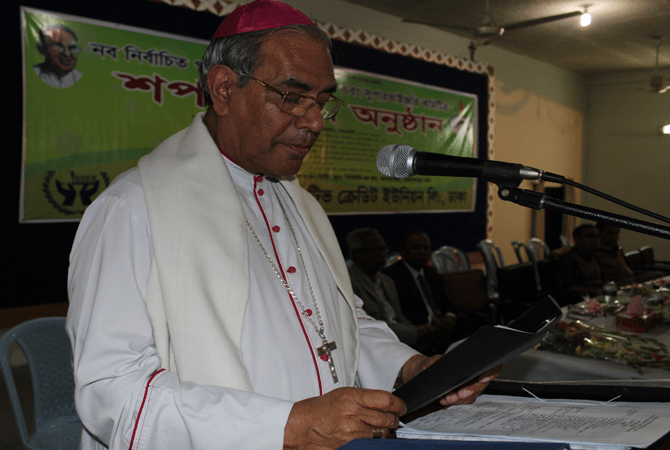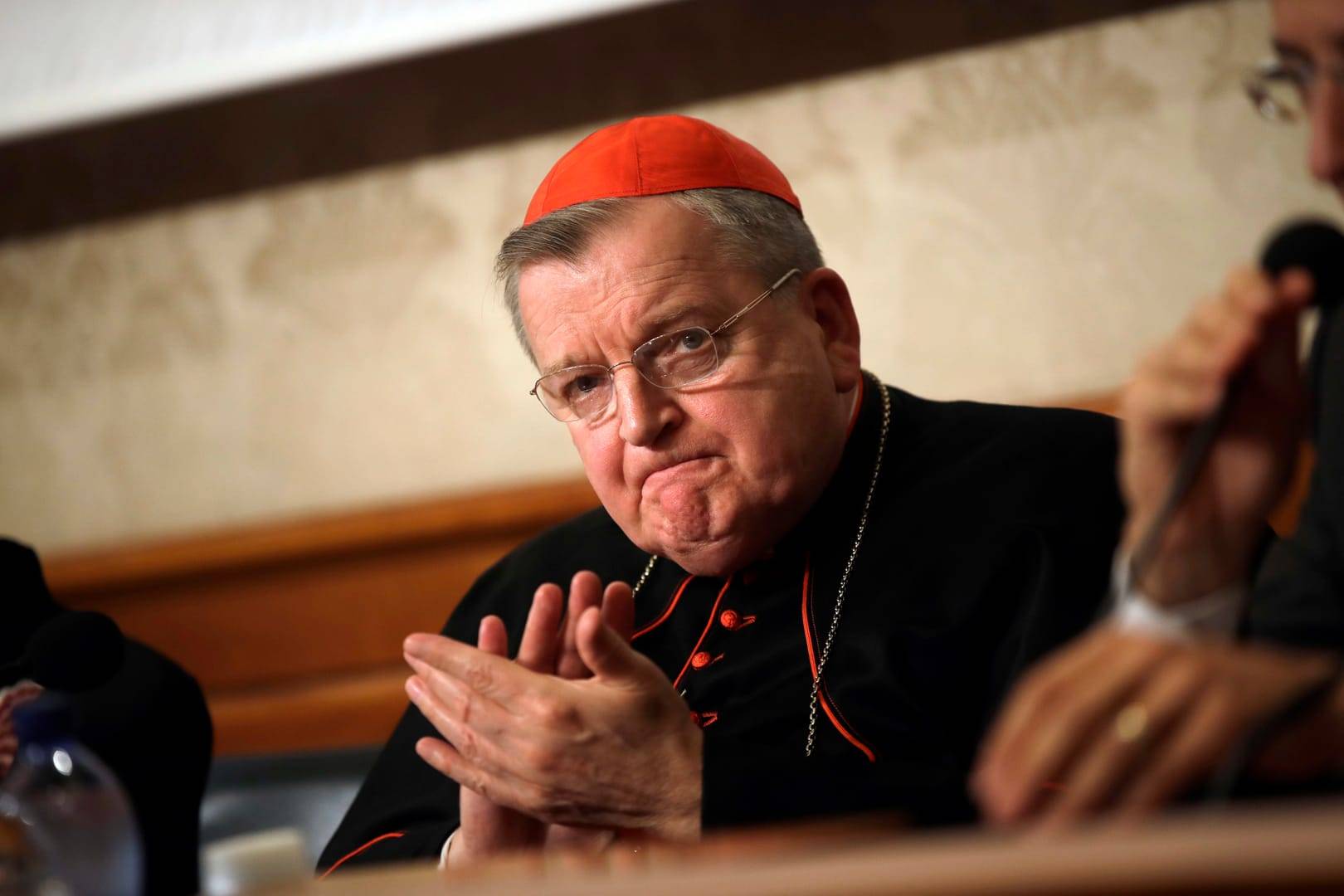[On Sunday, Oct. 9, Pope Francis announced a consistory on Nov. 19 for the creation of 17 new cardinals, including 13 under the age of 80 and therefore eligible to vote for the next pope. Crux is offering a series of profiles of the new cardinals.]
Pope Francis is well known for his passion for the peripheries of the world, which is often reflected in the way he names new cardinals, and that’s certainly the case with his choice of Archbishop Patrick D’Rozario of Dhaka in Bangladesh.
Out of a total population of 153 million, which is overwhelmingly Muslim, the Catholic community in Bangladesh is estimated at around 350,000, making it basically .2 percent of the nation’s people.
Francis, however, famously does not measure significance by the usual worldly standards, and his choice of the 73-year-old D’Rozario is a classic case in point.
As a semi-comic footnote, D’Rozario told Crux he wasn’t given a heads-up about the announcement on Sunday and was celebrating a late afternoon Mass when it came, so most of his flock knew about 90 minutes before he did.
Born on Oct 1, 1943, D’Rozario is a member of the Congregation of Holy Cross, the same men’s religious order that runs the University of Notre Dame in the United States. That’s a tradition in Dhaka, where nine of thirteen men who have led the church there since the middle of the 19th century have been Holy Cross priests, including one, Bishop Peter Dufal, who went on to become a coadjutor bishop in Galveston, Texas.
D’Rozario was ordained a priest in 1972, and in 1990 he became the bishop of Rajshahi. He would go on to serve as the bishop of Chittagong in Bangladesh before being moved once again to become the coadjutor bishop of the Archdiocese of Dhaka, the country’s lone archdiocese and by definition the main point of reference for the local church.
In October 2011, D’Rozario succeeded Archbishop Paulinus Costa as the Archbishop of Dhaka. He’s also served as President of the Catholic Bishops’ Conference of Bangladesh and head of the United Forum of Churches of Bangladesh, earning high marks for leading the Christian community in what’s seen as a very difficult set of circumstances.
In June, D’Rozario led all the small Christian churches of Bangladesh in an ecumenical day of prayer for peace, just ahead, as it turns out, of a deadly terror attack at an upscale Dhaka restaurant that left 28 people dead, including 9 Italians, 7 Japanese, an Indian and 3 students at American universities.
“What surprised everyone is that the gunmen were not from the poor class, not from rural areas, and they were not educated in a madrasa,” D’Rozario told Vatican Radio after that attack. “They were from the middle class, the rich, well-educated.”
“That raises a lot of questions for the government, and for church leaders,” he said.
He didn’t shrink from naming radical Islamic indoctrination as a driving force.
“There are religious motives, because they’re so brainwashed they think they will go straightaway to heaven, and they’re ready to kill themselves,” he said.
“The whole country is waking up now,” he said, adding that the army and the police force can’t resolve the problem, but the situation needs a comprehensive social response.
D’Rozario also defended the peaceful majority of his country’s Muslims, saying “this kind of killing does not belong to any religion.”
One of his first tasks as a cardinal will be to take charge of preparations for Pope Francis’s trip to Bangladesh in 2017, which the pontiff himself recently confirmed during his in-flight news conference at the end of his outing to Georgia and Azerbaijan.
“My appointment as cardinal by Pope Francis is a blessing and a grace, and a recognition of the church in Bangladesh,” D’Rozario told Crux, “a recognition of the ‘smallness’ of the Church, but a church that’s vibrant in faith, and a witnessing church in society through our works.”
“This is also a gift to the people of the nation, people of all religions,” the new cardinal said. “Bangladesh has a lot of challenges and difficulties, but has the capacity and the resilience and the strength to develop.”
“I have been intensely involved in interreligious dialogue and, after the two tragic events in July, we have worked together to foster a culture of respect and harmony for all religions. Hence this is a recognition of the good things that is happening in our country, and a call to the country to go forward.”
Caritas India Executive Director Father Frederick D’Souza welcomed D’Rozario’s appointment.
“In view of the pope’s visit next year to Bangladesh, this is a welcome step by Holy Father to add the Archbishop of Dhaka as a member of the College of Cardinals,” he said.
“The church in Bangladesh is a significant contributor to national growth and this is definitely a recognition of the church’s role,” D’Souza said.
He added that D’Rozario leaves a positive personal impression on the people he meets.
“I met him once, and he came across as spiritual and passionate about the poor, and about the church’s positive role in developing the nation,” he said.
Bishop Paul Ponen Kubi, also a member of the Congregation of the Holy Cross, told Crux, “We welcomed this news with great joy.
“We had been expecting this,” Kubi said. “We are overjoyed, and tomorrow I will go and greet him personally.”
Asked about the significance for Bangladesh, Kubi emphasized the church’s minority status.
“Islam is the majority religion in Bangladesh and we Christians are a minuscule minority, so the appointment of Archbishop D’Rozario is a recognition by the universal Church of the tiny minority Church of Bangladesh.”
“We are very grateful,” he said, “and overjoyed.”
Jesuit Father Srijon Das said the naming of D’Rozario is “elevating the importance of the Bengali Christian community, and saying that the pope cares for the least and the small.”
Referring to the July attack, he said, the appointment also “brings the good news that the universal church is with the poor and the victims of terrorism.”
D’Rozario, Das said, “has been very vocal against the social and political injustices that have been going on in the church in Bangladesh. He also has been working hard to rebuild with compassion and mercy the broken families. He has been a good orator. His reflections have been appreciated both by the clergy and the laity.
“I am happy and hopeful that the church in Bangladesh will contribute to the nation-building through this appointment,” he said.

















